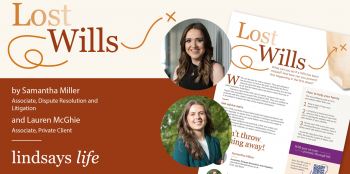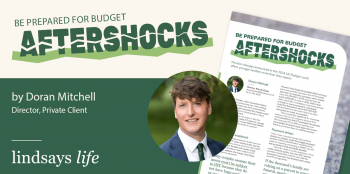Writing a Will is important. In the most basic terms, your Will is your instruction for what happens next and without it any decisions may not be your own.
If you die without a Will, the court will have greater involvement and your estate will be divided under the strict terms of the law. This often means more cost and unintended outcomes.
Here are nine consequences that might be faced if you don’t make a Will:
- Control – the person(s) in control of administering your estate will be determined by the court and those principally entitled to do that can be surprising (e.g. an ex-wife where the main beneficiary is a minor child). Dealing with the court also introduces additional cost.
- Insurance – a court appointed executor will often need to take out a specialist insurance policy before the court will allow them to manage the deceased’s estate.
- Distribution of estate – your estate will be distributed in accordance with the scheme of division under Scots law which often does not favour a surviving spouse and can prejudice all but a very narrow set of intentions. There would, for example, be no provision for friends, step-children, god-children, and charities.
- Protection of beneficiaries – if notionally intended beneficiaries might be young, vulnerable, in debt or going through a divorce, without a Will you have no means of protecting or managing their inheritance. In Scotland, a beneficiary is entitled at 16. That, of itself, is often unintended but an ill-timed windfall can carry further unwelcome consequences.
- The nanny state – where the absence of a Will and the presence of minor beneficiaries come together, the government (in the form of the Accountant of Court) becomes involved and remains involved until a beneficiary turns 16. This might be perceived as interference and often introduces cost which might not otherwise be involved.
- The penniless partner – an unmarried surviving partner will have no automatic right to a share in your estate and will, instead, be forced to involve the courts to lay claim to an inheritance. This can be financially costly and emotionally fraught at what is already a difficult time.
- The opportunist – a cohabitant never intended as a beneficiary can potentially involve the courts to claim a share in your estate, reducing the share available to others (e.g. children).
- Bringing up baby – Scots law provides for a very user-friendly mechanism of appointing Guardians for minor children in the event that people die in the wrong order. This is commonly done via a Will and in the absence of that provision the Court (and attendant cost) beckons.
- The taxman cometh – a Will is a functional and bespoke legal document. Part of that function is the minimising or mitigating of an individual’s or a couple’s exposure to Inheritance Tax, having regard to his, her, or their individual circumstances. Without a Will, many estates which might otherwise avoid tax altogether become taxable, with beneficiaries’ entitlements reducing accordingly.
With appropriate professional advice and guidance, your Will is the effective expression of how you would like your estate to be dealt with after death and, importantly, who you intend to benefit.
Guidance can include the use of trusts, guardianship provisions and tax reliefs, it might also involve what can happen with a family business and will include consideration of who should handle these things when the time comes.
Whether the aim is tax planning or the management of wealth and property passing to generations two, three or beyond, the Will is the mechanism for getting family wealth from A to B effectively and as you would wish.
























